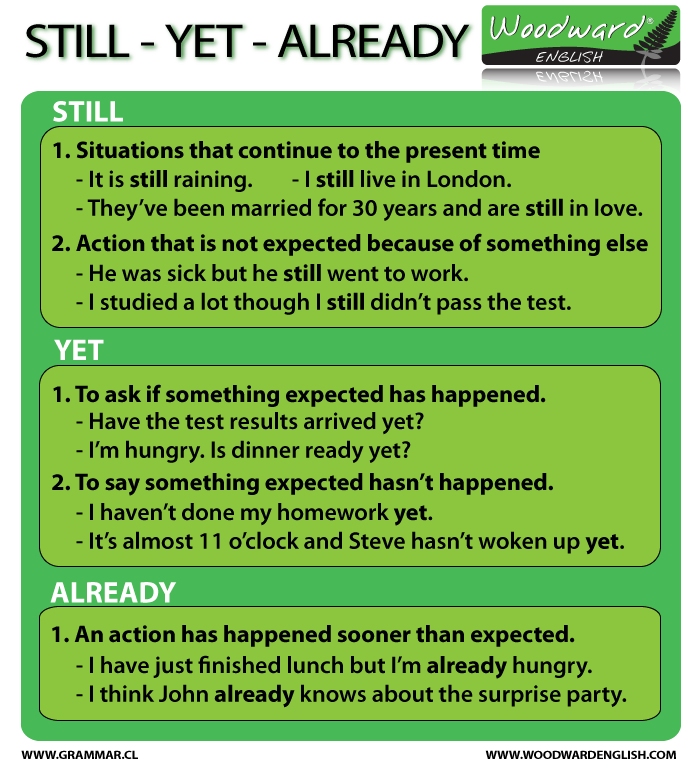Still - Yet - Already
English Grammar Rules
Three adverbs that often cause difficulty are still, yet, and already.
They are all used when actions are going to happen, or are expected to happen, or were unexpected around the present time. Here we go into more detail about the difference between still, yet and already:
STILL
Still is used to say an action or situation continues to the present because it has not finished.
It often refers to something happening for longer than expected.
Notice the position of still before the verb or adjective.
- My grandfather is sixty-nine and he still works every day at the kiosk he owns.
- Do you still live with your parents?
- It's 8pm, and I can't leave the office because I still have work to do.
- Are you still angry with your partner?
- He is still asleep so don't wake him up.
If the verb has two parts, still goes between both the verbs:
- She started her exam an hour ago and she is still answering the questions.
- Is it still snowing? (= it continues to snow, it hasn't stopped)
- When I went to bed, Angelica was still working.
But if one of the two verbs is negative, still goes before that negative verb:
- Lucy has stopped smoking but her brother still hasn't quit.
- I took the clock to the repair shop though it still isn't working.
YET
Yet refers to an action that is expected in the future. It is not used in the past.
To ask if something expected has happened. It is usually placed at the end of the sentence or question.
- Are we there yet? (A typical question kids ask while taking car trips with their parents)
- Is the report ready yet?
- Hasn't your mother told you yet? We're moving to Alaska!
To say that something expected hasn't happened:
- Mary can't go home yet, she hasn't finished her work.
- They haven't paid me yet. (I was expecting to paid before now.)
- My parents haven't kicked me out of their house yet.
Yet is occasionally used in affirmative sentences, giving the sentences a similar meaning as the use of still. Note that this is more formal and not common.
- We have yet to hear the big news from Aunt Martha.
= We are still waiting to hear the big news from Aunt Martha.
Often, we use still and yet together to explain why an action is continuing.
- I am still studying at the university because I haven’t graduated yet.
- We still don’t know who will be our new boss. The owners haven’t told us yet.
- I haven’t decided yet if I’m going to quit my job to go travel. I’m still thinking about it.
ALREADY
Already is used to refer to an action that happened sooner than expected.
It is used in affirmative sentences in the present or past, but never future.
- A: Ask Katie to send the article to her editor. B: She has already sent it.
- I already know what I'm going to buy you for your birthday.
- They've already seen "Spiderman 15" and really don't want to see it again.
Notice the placement of already in the examples below:
- Is Mary already here? She must have driven very fast to get here before me.
- How does he already have the answers to tomorrow's test?
- Have they already obtained their visas?
In present tense sentences, it is placed between the subject and verb.
In present and present perfect questions, it comes immediately after the subject.
However, in present perfect sentences, the order is subject + have+ already + past participle.
Summary Chart

Next activity
Try our interactive game to practice Still, Yet and Already.
See our other lesson about the difference between Still, Yet and Already (including updated charts).
If you found this grammar guide about the difference between Still, Yet and Already in English useful, let others know about it.
